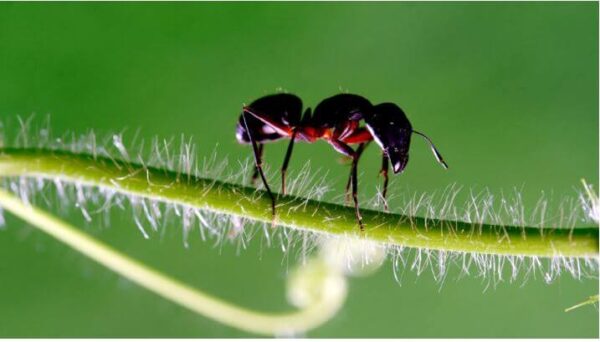Neem oil is a popular natural/organic pesticide extracted from neem tree seeds. It is a non-toxic solution with a garlic smell and a bitter taste. But does neem oil kill ants? Although ants are hard workers and help improve drainage and soil aeration, they are sometimes a nuisance. They have a reputation for harming grass and other plant roots and foliage. For this reason, there is a need to eliminate them from your lawn or garden. You need to know if neem oil kills ants and how? Keep reading.
Neem oil is a potent organic pesticide that kills ants and other pests like aphids if you spray it on them directly. It has two active ingredients, clarified hydrophobic and azadirachtin, which are effective insecticides.
Azadirachtin poison eliminates ants by tampering with their feeding behavior while clarified hydrophobic blocks their spiracles, suffocating them. Some studies on neem oil and fire ants show that the solution is effective when sprayed directly on fire ant mounds.
Does Neem Oil Kill Ants?

The short answer is yes! Neem oil is among the most effective pesticides that will kill garden ants. Generally, it has a reputation as a perfect repellant and effectively eradicates common pests, including aphids and ants.
But here is the big question, how will neem oil kill ants? Keep reading.
Neem oil has two active ingredients, clarified hydrophobic and azadirachtin, which are toxic to ants. When you spray the oil directly on ants, they ingest these chemicals, which disrupts the insect’s hormonal system.
Azadirachtin slowly poisons ants by tampering with their metabolism, which reduces their feeding behavior. In a few days, the ants will find it difficult to feed and lay eggs and eventually die of starvation.
On the other hand, clarified hydrophobic acts as a suffocating agent. It kills ants, aphids, and other insects by blocking their spiracles.
If you’re wondering how to use Neem oil for ants, it is applied in wet form. Therefore, mix the oil with water and spray directly on ant trails.
How to Mix Neem Oil to Kill Ants
To make a neem oil solution for killing ants, here’s what you require;
- Cold-pressed neem oil
- Clean, warm water
- Emulsifier agents like dishwashing soap or silica
- A teaspoon
- A spray bottle
1. Prepare the emulsifier or mixing agent. Water and neem oil do not mix readily. So, mix a tablespoon of silica or liquid dish detergent with a tablespoon of oil. Shake the ingredients thoroughly.
2. Fill your spray bottle or mixing bucket with warm water. Add the emulsified oil to your water and mix thoroughly. Ensure the ingredients dissolve entirely before spraying the solution to the infested lawns or ant trails.
Frequently Asked Questions (FAQs)
Q: Is Neem oil toxic to humans?
A: Yes, neem oil is toxic, particularly to children, infants, and pregnant women. If they ingest this product, it can result in seizures, metabolic acidosis, severe brain ischemia, encephalopathy, and kidney failure. Also, women trying to conceive should avoid consuming this oil.
Q: Can Neem oil kill plants?
A: Although neem oil helps keep pests away from your vegetation, it can also kill plants by burning their foliage. However, you can prevent this problem by using the product only in the morning and evening. If you apply it mid-day, the oil and direct sunlight will burn the plants.
Q: Does Neem oil kill flies?
A: Neem oil kills various insects, including aphids, leafhoppers, thrips, and flies, and is known to have low toxicity levels to humans and pets.
Conclusion
Neem oil is a non-toxic and effective ant and pest control repellant. It has two active ingredients, azadirachtin and clarified hydrophobic, which are potent insecticides. Once ants ingest the oil, these chemicals tamper with their feeding behavior and inhibit their growth. The ants ultimately die of starvation and suffocation.


